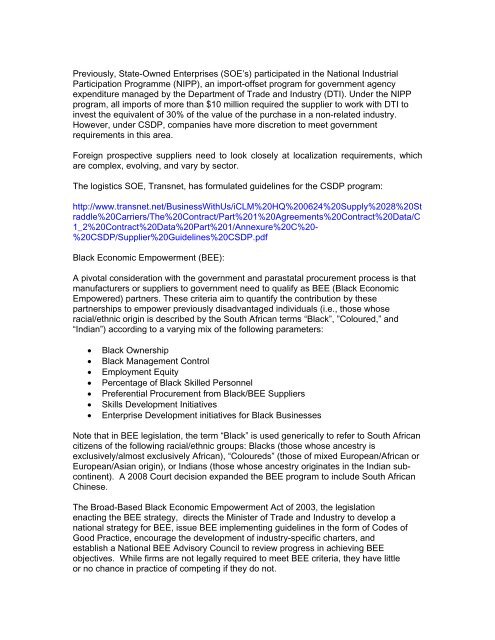South Africa - International Franchise Association
South Africa - International Franchise Association
South Africa - International Franchise Association
You also want an ePaper? Increase the reach of your titles
YUMPU automatically turns print PDFs into web optimized ePapers that Google loves.
Previously, State-Owned Enterprises (SOE’s) participated in the National Industrial<br />
Participation Programme (NIPP), an import-offset program for government agency<br />
expenditure managed by the Department of Trade and Industry (DTI). Under the NIPP<br />
program, all imports of more than $10 million required the supplier to work with DTI to<br />
invest the equivalent of 30% of the value of the purchase in a non-related industry.<br />
However, under CSDP, companies have more discretion to meet government<br />
requirements in this area.<br />
Foreign prospective suppliers need to look closely at localization requirements, which<br />
are complex, evolving, and vary by sector.<br />
The logistics SOE, Transnet, has formulated guidelines for the CSDP program:<br />
http://www.transnet.net/BusinessWithUs/iCLM%20HQ%200624%20Supply%2028%20St<br />
raddle%20Carriers/The%20Contract/Part%201%20Agreements%20Contract%20Data/C<br />
1_2%20Contract%20Data%20Part%201/Annexure%20C%20-<br />
%20CSDP/Supplier%20Guidelines%20CSDP.pdf<br />
Black Economic Empowerment (BEE):<br />
A pivotal consideration with the government and parastatal procurement process is that<br />
manufacturers or suppliers to government need to qualify as BEE (Black Economic<br />
Empowered) partners. These criteria aim to quantify the contribution by these<br />
partnerships to empower previously disadvantaged individuals (i.e., those whose<br />
racial/ethnic origin is described by the <strong>South</strong> <strong>Africa</strong>n terms “Black”, ”Coloured,” and<br />
“Indian”) according to a varying mix of the following parameters:<br />
• Black Ownership<br />
• Black Management Control<br />
• Employment Equity<br />
• Percentage of Black Skilled Personnel<br />
• Preferential Procurement from Black/BEE Suppliers<br />
• Skills Development Initiatives<br />
• Enterprise Development initiatives for Black Businesses<br />
Note that in BEE legislation, the term “Black” is used generically to refer to <strong>South</strong> <strong>Africa</strong>n<br />
citizens of the following racial/ethnic groups: Blacks (those whose ancestry is<br />
exclusively/almost exclusively <strong>Africa</strong>n), “Coloureds” (those of mixed European/<strong>Africa</strong>n or<br />
European/Asian origin), or Indians (those whose ancestry originates in the Indian subcontinent).<br />
A 2008 Court decision expanded the BEE program to include <strong>South</strong> <strong>Africa</strong>n<br />
Chinese.<br />
The Broad-Based Black Economic Empowerment Act of 2003, the legislation<br />
enacting the BEE strategy, directs the Minister of Trade and Industry to develop a<br />
national strategy for BEE, issue BEE implementing guidelines in the form of Codes of<br />
Good Practice, encourage the development of industry-specific charters, and<br />
establish a National BEE Advisory Council to review progress in achieving BEE<br />
objectives. While firms are not legally required to meet BEE criteria, they have little<br />
or no chance in practice of competing if they do not.
















